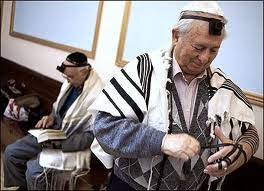Well let's start with the origins of New Year celebrations. According to Wikipedia The Romans dedicated this day to Janus, the god of gates,
doors, and beginnings. The month of January was named after Janus, who had two
faces, one looking forward and the other looking backward. This suggests that
New Year’s celebrations are founded on pagan traditions.
In 46 BCE the Roman Emperor Julius Caesar made adjustments
to the Roman calendar, including beginning the new year on January 1 rather
than in March. In practical terms, all cultures celebrate the new year
according to their particular calendar and the Romans were no different. When
the Roman Empire became the Holy Roman Empire under Constantine, at his mother
Helena's behest, the Christian world carried on the custom of celebrating the
Roman new year.
Later it became a date in the Gregorian calendar of Christendom,
New Year's Day liturgically marked the Feast of the Brit of Jesus. Note That January 1st is exactly 8 days after December 25th. For hundreds of years the Catholic Church celebrated New Year as a religious holiday. The Rema writes that New Year’s day is a
Christian Holiday indeed it is clear that it is the eighth day of Christmas as much as New Year’s
day whose celebration must be avoided and can only be marked when long term
life threatening hatred to our community will result if gifts are not given. (See Darche Moshe Y.D. 148)
Origins of Sylvester Day
In many European countries this day was named after Saint
Sylvester (314-335 CE).
Christianity grew under his rule and it is believed that he died on December
31. There is nothing remotely Jewish about
"Sylvester Day." So why is it celebrated in Israel? Israeli society flows according to the Jewish calendar.
Schools and businesses are closed on Shabbat, and the whole country shuts down
on Jewish holidays like Yom Kippur. For that reason the secular/Christian new
year has little significance. Yet when some ultra-secularists discovered that
most of the world holds a "New Years party," they didn't want to feel
left out. Yet they couldn't call it "New Years" because that
title was already taken by Rosh Hashana. So the name Sylvester was adopted instead. However according to Rochel Sylvetsky, Sylvester was always a night of fear for Jews with many pogroms taking place. Similar to what happened on Christmas Eve.
But, despite the origins of New Years, today seems to be very different. There is no real sense
of it being a religious holiday at all. Over the last 300 years it has become completely secularized to the point that even religious Christians do not celebrate the date as a religious holiday at all and it might well have lost its status as a religious holiday. Rav Moshe Feinstein notes (Iggerot Moshe Even HaEzer 2:13) that the first day of the year for them is not prohibited according to law, but pious people should be strict.
of it being a religious holiday at all. Over the last 300 years it has become completely secularized to the point that even religious Christians do not celebrate the date as a religious holiday at all and it might well have lost its status as a religious holiday. Rav Moshe Feinstein notes (Iggerot Moshe Even HaEzer 2:13) that the first day of the year for them is not prohibited according to law, but pious people should be strict.
So despite the Pagan and Christian origins of New Year, today there is no hint of those origins in the current practices an celebrations. Therefore it would be permitted to celebrate albeit taking care with how one conducts him/herself. Personally I don't celebrate New Year but that might have more to do with me being boring rather than a transgression of Jewish Law!
For more information on this see Rabbi Broyde's article in full.
For more information on this see Rabbi Broyde's article in full.


.jpg)


















